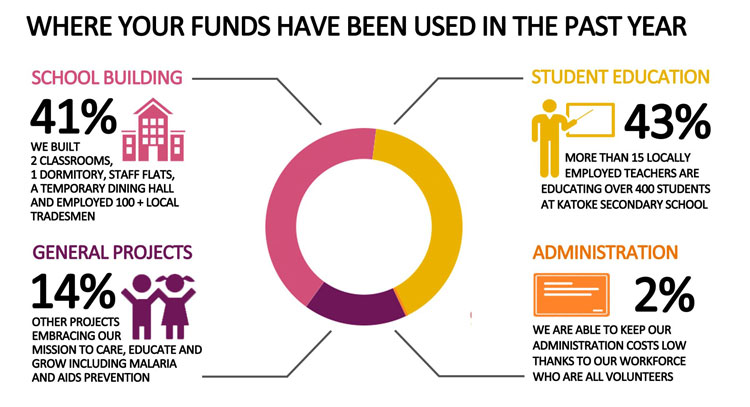Frequently Asked Questions
Some of the most frequently asked questions are included below. If you cannot find the answer to your question please contact info@katoke.com.au.
Katoke is located in North Western Tanzania in a region where Tanzania neighbours Rwanda and Uganda.
Katoke is a generic term applied to a collection of small villages covering about 10,000 people. It gives its name to the adjacent government teachers college campus. It is located in the Muleba District, part of the Kagera Region of Tanzania. It is on the western shores of Lake Victoria, the second biggest freshwater lake in the world, and is about one degree south of the equator.
Closest capital city and airport: The closest capital city and airport is Bukoba approximately 50km (45mins by car) from Katoke.
Closest major cities: Entebbe, Uganda is approximately 350km to the north; Nairobi, Kenya is approximately 800km to the east.
Katoke and indeed Tanzania as a whole, is a safe and peaceful place with relatively little conflict and has a Christian, Muslim, and Animist (Witchcraft) mix. Most villagers are caught in the poverty trap, and without assistance, have no way out.
Population/ Language: Tanzania has a population of 66 million people that speak Kiswahili, a little bit of English and various tribal languages. Secondary school is taught in English.
Employment: 80% of the population are active in rain-fed, low technology agriculture.
Temperature and climate: Katoke has a wet (March to May and October to December) and dry season and is normally quite green and scenic. Katoke has a comfortable average temperature of between 18 and 25 degrees Celsius all year round.
Poverty: The poverty headcount ratio in Tanzania is 28.2% (National poverty headcount ratio is the percentage of the population living below the national poverty lines). The United Nations Human Development Index has listed Tanzania as 151st of 188 nations for poverty, and of the 23 regions of Tanzania, the Kagera region (where Katoke is located) is one of the poorest.
Health: Life expectancy in Tanzania is around 65 years, compared to Australia’s 82. The rate of HIV is thought to be around 5% in Tanzania and in Katoke this is around 1%.
No. While the Katoke Trust For Overseas Aid is an interdenominational Christian organisation, we provide aid to all people in need irrespective of race, religion or gender.
The Trust partners with the local community and churches, especially with the Anglican Church, which owns the 804 acre Katoke site where the secondary school is located.
Education is a powerful tool for breaking the cycle of poverty, yet many children in Tanzania face significant barriers to learning. While progress has been made, access to quality education remains a challenge—especially in rural areas.
At Katoke Trust, we are committed to bridging the education gap by supporting students through scholarships, resources, and improved school facilities. Here’s what you need to know about the Tanzanian education system and how we can make a difference together.
The Structure of Tanzania’s Education System
✔ 7 years of primary education (Standard 1-7, ages 7-13)
✔ 4 years of secondary ordinary education (Form 1-4)
✔ 2 years of advanced secondary education (Form 5-6)
✔ 3+ years of university or vocational training – Available to a small percentage.
Primary Education
There are 7 years of primary education for ages 7-13, generally taught in Kiswahili.
- Compulsory & Free: In 2001, Tanzania introduced free primary education, increasing enrollment from 59% in 2000 to 94% in 2011.
- Overcrowding & Teacher Shortages: Many schools struggle with high student-teacher ratios, making quality education difficult.
- Language Barrier: Lessons are taught in Swahili, but secondary education shifts to English, creating learning difficulties.
Despite being free, hidden costs such as uniforms, books, and transport still make education inaccessible for some families.
Secondary Education
- Tuition Fees: Unlike primary education, secondary schooling isn’t free, preventing many students from continuing.
- Low Transition Rate: Only around 30% of students transition to secondary school (up from 6% in 2000).
- Gender Inequality: Fewer girls complete secondary education.
Students complete national exams after form 2 and form 4. Students successful in reaching the pass marks for form 4 in certain courses can continue onto forms 5 and 6.
Higher Education
- Advanced Secondary Education (Form 5-6): Only high-performing students qualify.
- University & Vocational Training: Limited spots, with fewer than 5% of students enrolling in university.
- Employment Challenges: Even with a degree, job opportunities are scarce.
The Biggest Challenges Facing Education in Tanzania
With rapid expansion of education in recent years some of the challenges remain:
- Average of 50 pupils in each government primary school classroom in 2022.
- Shortage of trained teachers – Many teachers lack proper training and materials. The pupil-to-qualified teacher ratio stands at 49:1.
- Poverty & hidden costs – Even with free primary education, families struggle with additional expenses.
- Most schools face extreme shortages in textbooks, desks, chairs, toilets, water supply, and hand-washing facilities. On average there is one textbook for every 5 students.
- English-language difficulties of students within schools.
🌍 How Katoke Trust is Making a Difference
At Katoke Trust, we believe education is the key to breaking the poverty cycle. We pride ourselves on providing quality education!
✔ Class sizes are capped at 40 students for form 1 to 4, and approximately 25 for forms 5 and 6.
✔ Classrooms are fully equipped for the number of students.
✔ School Infrastructure Projects, we provide fully equipped classrooms, library, kitchen, hall, and dormitories.
✔ Every class is instructed by a qualified teacher.
Want to help transform education in Tanzania? Support a student today.
🔹 Donate Now – Sponsor a student in need.
🔹 Learn More – Discover how Katoke Trust is making an impact through Katoke-Lweru Secondary School.
Katoke Trust for Overseas Aid (ABN 51 742 721 573) is endorsed by the Australian Taxation Office as a Deductible Gift Recipient.
Donations of $2 and over to the following funds are tax deductible:
- General donation
- Building program (used to build school facilities)
- Student and teacher sponsorship (used to develop students and teachers that graduate with skills to be economically self-supporting)
Funds contributed that are not tax deductible*:
- Tickets to the Annual Dinner and other events
- Purchase of local merchandise, auction items, raffle tickets
*To be able to offer tax deductibility on donations, Katoke’s activities must comply with the guidelines set out by the Australian Taxation Office and other government agencies. According to the Australian Taxation Office, where a material benefit is received, i.e raffle or event tickets or merchandise, unfortunately you are not entitled to claim the contribution as a tax deductible gift.
We are an organisation run entirely by volunteers in Australia. This helps us keep our administration costs low meaning more of the funds raised go directly to projects on the ground. If you are keen to volunteer or would like more information, see our Volunteer page for more details.
Note: All short-term volunteer trips to Katoke Tanzania are self-funded, and fundraising is encouraged. We do have a guesthouse available for volunteers on-site at the Katoke school. The Katoke Communications and Fundraising Committee can provide you with information and ideas to help you raise financial support for your volunteer trip. Contact events@katoke.com.au
Subject to availability, we can try to arrange for a suitable executive committee or sub-committee member to attend an event to give more information on the Katoke Trust and how people might like to get involved. Contact: info@katoke.com.au
Students love to write and receive letters from their sponsors. Students are encouraged to write once per term to their sponsor. The letters help to develop stronger relationships with the student you support.
The sponsorship committee is happy and prefers to facilitate the exchange of letters rather than students and sponsors communicating directly. This helps to protect sponsors from receiving unsolicited or inappropriate requests, protects sponsor’s personal details, and also allows for letters to be interpreted or translated where necessary. We also ask sponsors to avoid contact via social media such as facebook, which can be unhelpful for students living in a very different place.
We prefer that physical or monetary gifts are not exchanged with the students. The gift of sponsorship is already a substantial gift that can radically improve the prospects for a student and their family. When resources are limited, we would prefer to offer more students the chance for sponsorship. Gift giving can also contribute to social (e.g. jealousy or theft), administrative reasons (e.g. costs of sending gifts), or cultural issues (e.g. appropriateness of gifts).
Your relationship with your sponsored child is valuable. For this reason, we believe that it’s important for both the sponsor and the sponsored child to continue with a sponsorship if at all possible. However, we also understand that from time to time you may experience difficulty (financial or otherwise) in being able to continue your sponsorship. Please contact the sponsorship team to discuss options available to you to decrease or cease your sponsorship: sponsorship@katoke.com.au
In the event your sponsored student no longer attends the school due to health, insufficient course results etc, we will consider how we can still continue to support the welfare of the student in other ways. If you are still willing to sponsor a student, we will seek to transfer your sponsorship to one of the many other students needing sponsorship. You will be contacted by the sponsorship committee where relevant.
Please contact treasurer@katoke.com.au
There are lots of ways you can contribute to Katoke. You can Sponsor a student, attend a Fundraising event, or simply Make a Donation.
We prefer credit card or direct debit. Recurring contributions can also save us a significant amount of money in fees and administration costs, meaning more can be dedicated to our programs. If you prefer to donate by cheque, please make them payable to the Katoke Trust for Overseas Aid.
GiveNow is backed by Westpac and is Australia’s only free online donations solution for community organisations. It is a very secure and safe service, and except for fees charged by credit card merchants, the service is completely free of charge for both donors and community organisations. It also issues tax receipts immediately which saves administration for charities like Katoke run completely by volunteers.
We are however in the process of setting up the Katoke website to take direct donations straight to Katoke’s bank account. Stay tuned!
Yes! When creating your Will, firstly provide for family and friends, and then consider whether you can also include a gift to Katoke. See our Fundraising page for details.
We are committed to earning, and keeping, the trust and confidence of our donors, sponsors and supporters through complete transparency and integrity.
Run by volunteers, virtually 100% of funds raised goes to projects on the ground.
Annual audits: We are independently audited annually here in Australia. The Secondary school is also independently audited in Tanzania.
Other compliance: Katoke Trust for Overseas Aid (ABN 51 742 721 573) is endorsed by the Australian Taxation Office as a Deductable Gift Recipient. We comply with all required regulations.
See further information at Accountability
See related FAQs: How is money used?
If you donate through via the Katoke website or givenow* you will receive your tax receipt instantly via email.
If you sponsor a student and pay in monthly installments/ direct debits, you will receive your tax receipt at the end of the financial year.
If you sponsor a student with an upfront lump sum contribution, you will be acknowledged with a tax deductible receipt upfront on payment.
If you have not received your tax receipt please contact treasurer@katoke.com.au.

